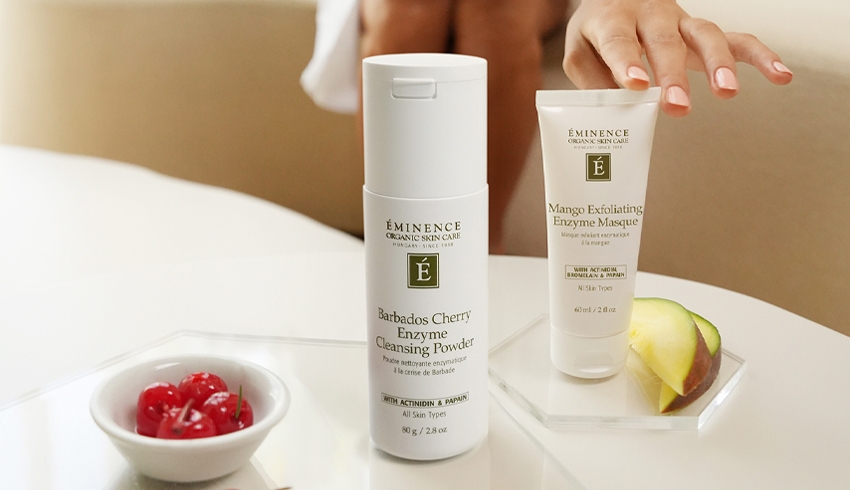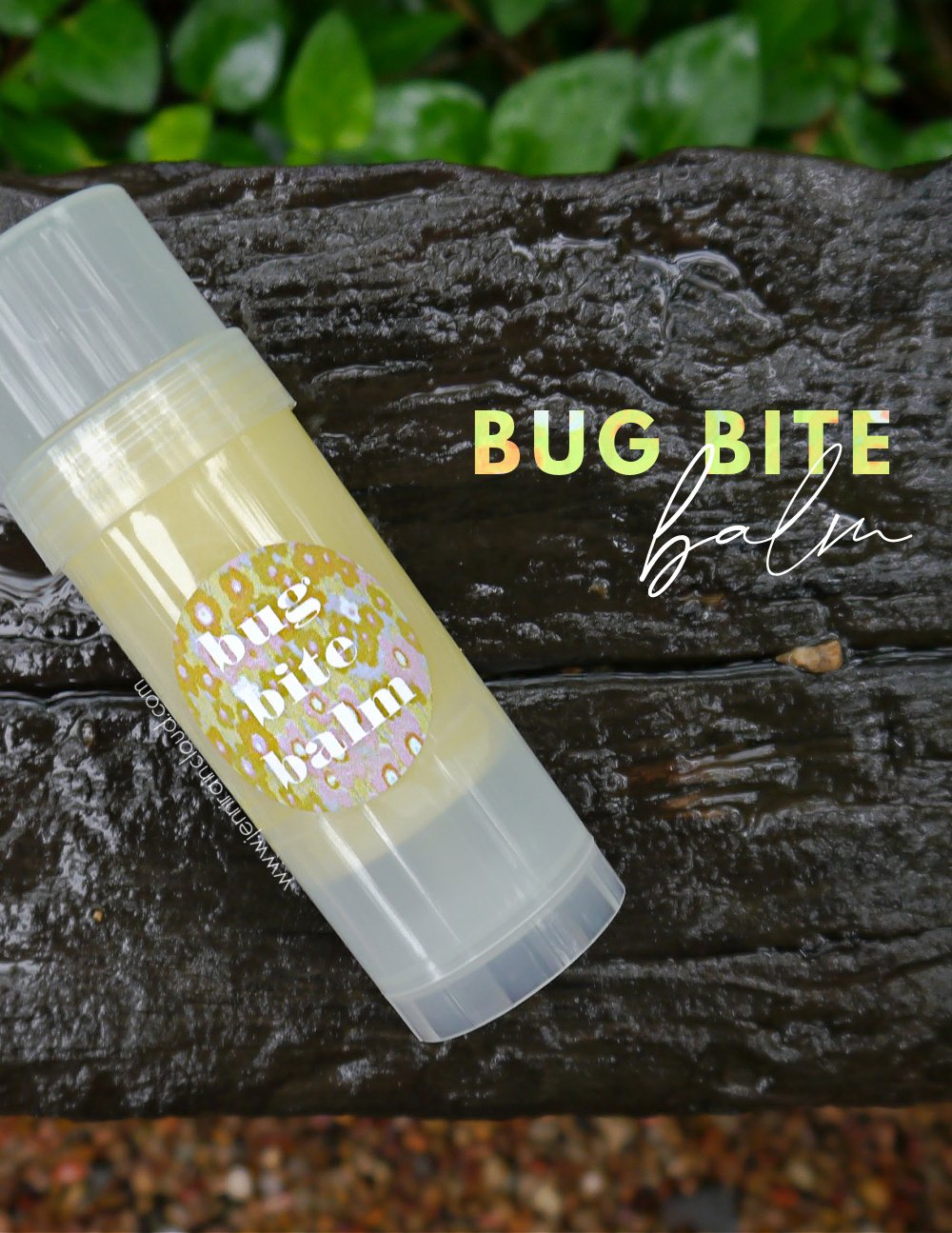Exfoliating is the secret weapon of skin care. It might already be a part of your routine, but did you know that it’s the go-to for glowing skin? Its function is to get rid of dead cells that can accumulate on the surface of the skin and cause the complexion to look dull. This makes exfoliation a great step to focus on if you want to reveal soft, luminous and even skin. Exfoliation can be broken down into chemical and physical — but even within those categories, there are subcategories. Enzymes and acids make up a group of chemical exfoliants, perfect for all skin types including sensitive skin. Ready for a lesson? Let’s break it down.
3 Types Of Exfoliation
A quick refresher: Exfoliation is the process of removing those dead skin cells from the surface of your skin using a safe chemical, a granular substance or an exfoliation tool. While we usually discuss exfoliation in relation to skin on the face, it can actually be performed on almost all of the skin on the body — from dry elbows to scaly legs and cracked heels. When that layer of dead skin is gone, the skin underneath looks polished and brighter (since dead skin = dullness). The fresh, glowy skin is then better prepared to evenly absorb any products that are applied afterwards, including moisturizers, serums and self-tanners.
There are three main types of exfoliation:
- Physical Exfoliation
- Chemical exfoliation using acids
- Chemical exfoliation using enzymes
Physical Exfoliation
Physical exfoliation involves using a scrub or tool to manually remove dead skin cells from the surface of your skin. This method often includes products with small grains or beads, or tools like brushes or exfoliating cloths. Physical exfoliation can leave your skin feeling instantly smooth and refreshed. However, it’s important to be gentle to avoid irritating your skin or causing microtears.
Chemical Exfoliation Using Acids
Chemical exfoliation with acids involves applying products that contain alpha hydroxy acids (AHAs), beta hydroxy acids (BHAs) or polyhydroxy acids (PHAs) to your skin. All three of these acids are exfoliating ingredients that work by breaking down the bonds that keep dead skin cells clinging to the skin’s surface. By breaking down these bonds, acids can bring out new, fresher-looking skin. Each type has its own unique benefits: AHAs are water soluble and target dullness, dehydration and signs of aging. BHAs are oil soluble, penetrate deeper into the skin and balance oils (a savior for breakout-prone skin). PHAs are gentle and non-irritating, so they’re suitable for sensitive skin.
Chemical Exfoliation Using Enzymes
Enzyme exfoliation uses natural enzymes, often derived from fruits like papaya or pineapple, to gently break down the keratin protein in dead skin cells. This method is particularly gentle and suitable for sensitive skin because it works without scrubbing or using acids. Enzyme exfoliants are great for brightening the look of the skin and improving texture without the risk of irritation that some might experience with acid-based exfoliants.
Each type of exfoliation offers unique benefits, so choosing the right one depends on your skin type and needs.
Whether you prefer the instant results of physical exfoliation, the deep cleansing power of chemical acids or the gentle touch of enzymes, regular exfoliation is key to maintaining healthy, glowing skin.
What Are Enzymes? Difference Between Acids & Enzymes
Enzymes help accelerate chemical processes. You’ve probably heard of enzymes in the context of digestion. They are proteins (usually made in the body) that help break food down into smaller parts so your body can easily digest the nutrients. When it comes to enzymes on the skin, their role is to break down keratin — aka the protein in dead skin cells that makes them stick together on the surface. In that sense, enzymes are similar to acids, but they often feel gentler and less intense on the skin. These tiny molecules (often harvested from fruit like pineapple, pumpkin, cherries and papaya) help to dissolve old fibers in the skin to make way for new ones to be synthesized. Without enzyme activity, you would see a buildup of dead cells and old fibers on the skin.
So, what sets enzymes apart from acids? Enzymes get rid of those dead skin cells at the surface of the skin, but they don’t promote cell turnover for living cells underneath. Enzymes help shed skin that’s already dead, rather than letting it sit on the surface and cause dullness. They exfoliate and brighten the complexion, are generally recommended for use about every 2–3 days and are safe to use while pregnant, though we always recommend speaking to your doctor.
Acids, on the other hand, penetrate deeper into the skin and accelerate turnover for all of your skin cells, not just the ones hanging out up top. Acids physically turn over the cells which can cause shedding of the skin and allow new skin cells to generate.
Which Exfoliant Is Right For You?
Wondering how to know which type of exfoliant is better for you? Because enzymes don’t penetrate as deeply into the pores, they tend to be less abrasive on the skin. If you have sensitive skin, then sticking to an enzyme-based exfoliant might be the answer.
Acids can work for various skin types, but you may have to play around to figure out which ones are the best option based on your skin concerns and goals. The forced cell turnover that some acids provide can be game-changing for hyperpigmentation, sun damage and acne.
Acids and Enzymes From Eminence Organics
Barbados Cherry Enzyme Cleansing Powder
The Barbados Cherry Enzyme Cleansing Powder transforms from a powder into a creamy foam when mixed with water. As you massage it into your skin, you’ll experience the gentle exfoliation provided by actinidin and papain enzymes, while Barbados cherry, Kakadu plum and diatomaceous earth work together to leave your skin even and balanced. Part of the Superfood Enzyme Collection, this cleanser harnesses the power of tropical enzymes like actinidin from kiwi, papain from papaya and bromelain from pineapple. These natural enzymes gently resurface the skin and enhance radiance without the need for harsh scrubbing, making them ideal for all skin types, including sensitive ones.Specifically, the actinidin in this cleanser, derived from kiwi, helps refine and smooth even the most delicate skin without causing irritation. Other effective enzymes in our Superfood Enzyme Collection include bromelain, derived from pineapples grown in Thailand, which contains amino acids to break down dead skin cells, revealing smoother-looking skin. Papain, sourced from unripe papayas (also grown in Thailand) is effective in softening and exfoliating the look of the skin. These enzymes are a natural and gentle way to enhance your skin care routine, promoting a brighter and more even complexion. There are also skin care options that combine the benefits of both enzymes and acids. Here is a list of products that offer the best of both worlds for exfoliation.
Arctic Berry Peel & Peptide Illuminating System
The Arctic Berry Peel & Peptide Illuminating System is another option formulated with both enzymes and acids. This innovative 3-step peel and peptide system is designed to exfoliate and keep skin radiant in between spa treatments. The at-home system is a favorite, with 5-star reviews across the board. One customer, Trina, calls the set “amazing,” continuing in her website review: “Words cannot describe the huge difference in my skin. I have never experienced a more effective at-home product!!!!” Another fan, Abbie, says “My skin looks bright, tight, and my pores are significantly smaller – even my husband noticed. I’m buying it for both my husband and me to use,” and Stacy says “You Need This!” and is even sharing it with friends: “I could not be happier. About a day after using the product, your skin will be glowing. I love it so much, I’ve been giving it to others as gifts.”
Mango Exfoliating Enzyme Masque
The Mango Exfoliating Enzyme Masque is formulated to reveal brighter-looking skin with a trio of exfoliating fruit enzymes. Enzymes actinidin, bromelain and papain offer gentle yet effective enzymatic exfoliation that removes dead skin cells to soften the look of the skin for a smooth and glowy complexion. This mask contains mango, a superfood noted for its high concentration of antioxidants, including vitamin C, plus pineapple, another natural source of antioxidants. This formula also boasts Kakadu Plum, a source of vitamin C and antioxidants to help minimize the appearance of dark spots.
Yam & Pumpkin Enzyme Peel 5{9b0cebfefecba0e6bdf45dab380ff2aef24117588e828b835bd9eccaf84e3974}
The Yam & Pumpkin Enzyme Peel 5{9b0cebfefecba0e6bdf45dab380ff2aef24117588e828b835bd9eccaf84e3974} contains pumpkin, pineapple and papaya enzymes, as well as lactic and glycolic acids. This enzyme peel accelerates the exfoliation process, removes dead skin cells and reduces the appearance of dark spots, fine lines and sun damage. A delicious purée of yam and pumpkin, this exfoliant leaves the skin looking firm and radiant.
Pineapple Refining Tonique
If you’re looking for a toner with enzyme and acid ingredients, our Pineapple Refining Tonique uses both bromelain, a gentle yet effective enzyme exfoliant derived from the fruit and stem of the pineapple plant, and polyhydroxy acid (PHA), a mild exfoliant that noticeably renews the feel of the skin while targeting dryness and the visible signs of aging. The combination of both enzymes and acid helps brighten the look of the skin, minimizes the appearance of dark spots, unclogs pores and hydrates the skin.
Are you interested in adding enzymes into your exfoliation routine? Visit your nearest Eminence Organics Spa Partner to find out which ones are right for you.




